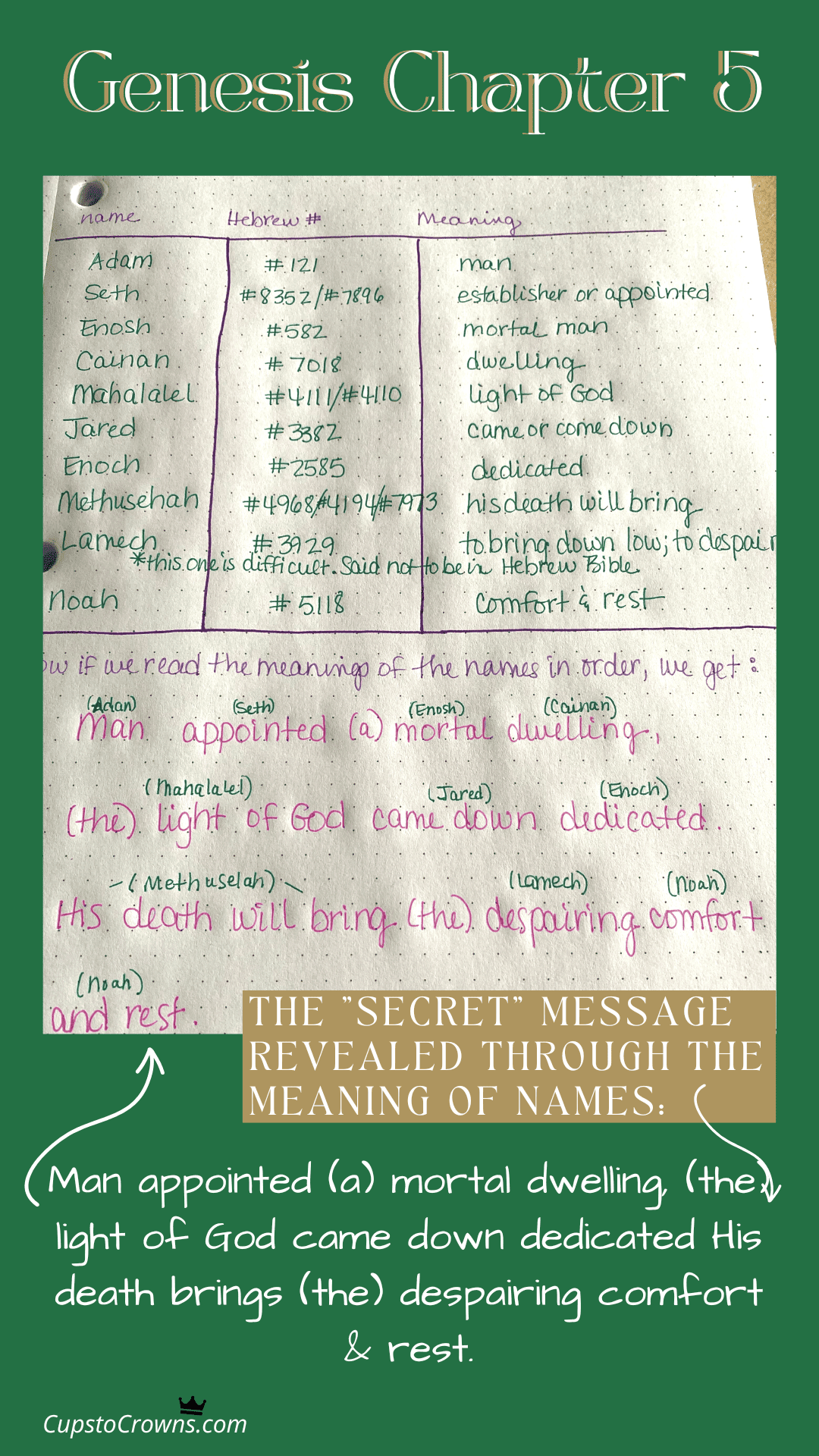Genesis Chapter 5: The Genealogy Of Mankind From Adam To Noah
(Deep Dive Chronological & Book-By-Book Journey Through The Bible)
It is so tempting to skip over the genealogy. I love researching family history with nothing more than a few names, dates, and sometimes a blurry photo or two. As you learn the facts about your ancestors, they take shape in your mind and become real.
For the Hebrew people, genealogies were a normal way of life. They passed their history down orally because written documentation was not a thing back then. Instead, family stories were told to children who told them to their children, and so on. It helped them remember not just their ancestors but the promises of God.
Genealogies are not an ancient, Old Testament thing. The book of Matthew (New Testament) begins with a genealogy showing the line from Adam to Jesus. Again in Luke 3:23-38, we have another genealogy.
Genealogies are typically only of interest to the family the genealogical study is about. Have you considered that the Bible is our genealogy? It is written stories of those who have come before us. It is part of our genealogy because everyone on earth can claim Adam and Eve as their ancestors. They were the beginning of it all.
There are three sets of genealogical lists in Genesis. There are two in chapter 4 (Cain’s line and Seth’s line) and all of chapter 5, which expands on Seth’s line. In this chapter, no one mentioned lived less than 365 years or greater than 969 years.
Comparing the genealogy listed in Matthew and those listed in Genesis and 1 Chronicles, we can see that the genealogies are not meant to be exhaustive.
As I was researching, it struck me how similar the names of Cain’s line and Seth’s line were. From what I have read, that typically means that the family lines were close. I don’t know if that is true. Even though Cain moved away from his childhood home, there is no indication that he broke off communication with family or stopped believing in God. God’s curse on Cain didn’t say that he could never return home or that he was cut off from the family.
Adam
(vs1-2)
This is the book of the generations of Adam. In the day that God created man, in the likeness of God made he him; male and female created he them; and blessed them, and called their name Adam, in the day when they were created.
The introduction of this chapter starts by reminding us of the history of man. Often, we need this reminder as we can lose focus and forget.
(vs3-5)
And Adam lived a hundred and thirty years and begat a son in his own likeness, and after his image; and called his name Seth: And the days of Adam after he had begotten Seth were eight hundred years: and he begat sons and daughters:
And all the days that Adam lived were nine hundred and thirty years: and he died.
Cain was alive when Seth was born yet he is not mentioned in this genealogy.
Adam was created in perfection in the image and likeness of God. Due to sin, Seth was created in the imperfect, fallen image and likeness of Adam.
Of the descendants listed, Adam is the only one who did not live to see Enoch taken up into heaven.
Questions to Consider:
“And he died.” Due to sin, all men are subject to death. Most of the genealogical accounts end with this phrase.
We are given one life. We have no clue how long we are given. We have no clue about the true impact of our words and actions on others. So, how are you living your life? Is it for God or yourself? Where is your focus? Are you content with laying up spiritual blessings in heaven or are you chasing the American ever-changing dream? When you pass from this earth, what are you leaving behind?
More Questions to Consider:
Do you believe Adam was created as a child, a teen, or a full-grown adult? In light of your views, how do you suppose it was determined that Adam was 930 years old when he died? Remember, nothing in the Bible is by coincidence and every word is true.
Seth
(vs6-8)
And Seth lived a hundred and five years, and begat Enos: And Seth lived after he begat Enos eight hundred and seven years, and begat sons and daughters. And all the days of Seth were nine hundred and twelve years: and he died.
I like what Bible Bujo said in her Genesis Chapter 5 YouTube video. She commented that Seth was not a replacement for Abel, he was in honor of Abel. I had trouble reconciling the fact that God created someone as a replacement. We are all unique and created for a purpose. But to think of being a replacement for the beloved original child didn’t sit right in my spirit. God used Bible Bujo’s comment in her video to settle that issue for me.
Enos
(vs9-11) And Enos lived ninety years, and begat Cainan: And Enos lived after he begat Cainan eight hundred and fifteen years, and begat sons and daughters. And all the days of Enos were nine hundred and five years: and he died.
Cainan
(vs12-14)
And Cainan lived seventy years and begat Mahalaleel: And Cainan lived after he begat Mahalaleel eight hundred and forty years, and begat sons and daughters. And all the days of Cainan were nine hundred and ten years: and he died.
Mahalaleel
(vs15-17)
And Mahalaleel lived sixty and five years, and begat Jared: And Mahalaleel lived after he begat Jared eight hundred and thirty years, and begat sons and daughters. And all the days of Mahalaleel were eight hundred ninety and five years: and he died.
Mahalaleel and Enoch tied for being the youngest (65 years old) when they each had their first child.
Jared
(vs18-20)
And Jared lived a hundred sixty and two years, and he begat Enoch: And Jared lived after he begat Enoch eight hundred years, and begat sons and daughters. And all the days of Jared were nine hundred sixty and two years: and he died.
Enoch
(v21-24)
And Enoch lived sixty and five years and begat Methuselah and Enoch walked with God after he begat Methuselah three hundred years, and begat sons and daughters. All the days of Enoch were three hundred sixty and five years and Enoch walked with God and he was not; for God took him.
Enoch walked with God for 300 of his 365 years of life. Isn't the number of his years on earth interesting? He lives 365 years, and we have 365 days in a year.
Walking with God is a hard concept to grasp. We like to think that because we are Christians, we walk with God. But that is not always the case. The best verse I have found to explain this concept is Deuteronomy 13:4, in which we learn 6 pieces of the puzzle of walking with God (the numbers listed are mine for emphasis):
“You shall follow the Lord your God (1) and fear Him (2); and you shall keep His commandments (3), listen to His voice (4), serve Him (5), and cling to Him (6).”
Hebrews gives us a bit more information on the life of Enoch. I’m sharing two versions of the same verse.
“By faith, Enoch was translated that he should not see death; and was not found, because God had translated him: for before his translation he had this testimony, that he pleased God. But without faith it is impossible to please him: for he that cometh to God must believe that he is and that he is a rewarder of them that diligently seek him.” (Hebrews 11:5-6 KJV)
“By faith, Enoch was taken up so that he would not see death; and he was not found because God took him up; for before he was taken up, he was attested to have been pleasing to God. And without faith, it is impossible to please Him, for the one who comes to God must believe that He exists and that He proves to be One who rewards those who seek Him.” (Hebrews 11:5-6 NASB)
Although Enoch’s life on earth wasn’t as long as the other men mentioned, he seems to have made every moment count by prophesying about God in a time of great depravity and ungodliness. We learn more about this from Jude 1:14-15:
“It was also about these people that Enoch, in the seventh generation from Adam, prophesied, saying, “Behold, the Lord has come with many thousands of His holy ones, to execute judgment upon all, and to convict all the ungodly of all their ungodly deeds which they have done in an ungodly way, and of all the harsh things which ungodly sinners have spoken against Him.”
The above verses are so full of hope for us!! Today, just as in the time of Enoch, many are walking around in spiritual darkness, blind to their sin and ignoring their creator as they worship idols and follow their lustful desires. Yet, despite this, Enoch remained faithful and focused on pleasing the One True God. Friend, if Enoch can remain true to God (despite what is popular and “normal”) we can too!
“And he was not; for God took him” (verse 24) means that Enoch didn’t die. He was raptured into Heaven. We have no way of knowing if anyone saw this happen or if it was a private experience.
It says Enoch walked with God after he sired his son Methuselah. This reminds us that walking closely with God is a process. It doesn’t happen in an instant, but over time as we are diligent to seek Him.
The note in my NIV study Bible says that Lamech, the seventh generation from Adam in the genealogy of Cain, was evil personified. But Enoch, the seventh generation from Adam in the genealogy of Seth, was commended as one who pleased God.
Cross Reference Verses:
Revelations 11:3-12, Genesis 17:1
Questions To Consider:
Enoch didn’t die. Instead, God took him up to heaven. According to some, Enoch will be one of the two prophets in Jerusalem that the anti-Christ overpowers and kills (Revelation 11;3-12). Of course, that is speculation. So who do you think the two witnesses will be? Hebrews 9: 27 says it is appointed to each man once to die. Why do you think God called Enoch into heaven instead of allowing him to face death?
Enoch began to walk with God after his son was born. Do you think there was a life-altering event or encounter to change his focus? Has God used such an event in your life to get your attention and adjust your focus?
Methuselah
(V25-27)
And Methuselah lived a hundred eighty and seven years and begat Lamech. And Methuselah lived after he begat Lamech seven hundred eighty and two years, and begat sons and daughters: and all the days of Methuselah were nine hundred sixty and nine years: and he died.
Methuselah lived longer than his father and his son. In fact, he is the longest living person in history.
Methuselah died the year of the great flood. Many feel God kept him alive so long to give the people a chance to repent or face God’s judgment through the flood.
Lamech
(v28-31)
And Lamech lived a hundred eighty and two years and begat a son: And he called his name Noah, saying, This same shall comfort us concerning our work and toil of our hands, because of the ground which the Lord hath cursed.
And Lamech lived after he begat Noah five hundred ninety and five years, and begat sons and daughters. And all the days of Lamech were seven hundred seventy and seven years: and he died.
As I stated in chapter 4, this Lamech is from the line of Seth, not the line of Cain. Though they shared the same name, they were very different people.
Lamech named his son for a purpose. Through divine discernment, he knew that God intended to use Noah to provide comfort and rest for the people.
This is the only time the number 777 is used in the Bible.
Question To Consider:
For as long as I have been a Christian I have heard it said that the number 7 is God's number for completion. Here, we learn that Lamech lived 777 years. Do you believe there is a connection? Do you think numbers signify anything special in the Bible or are they simply a coincidence?
Noah
(v32)
And Noah was five hundred years old: and Noah begat Shem, Ham, and Japheth.
As you look at the years given, Noah is the only descendant not alive during Adam’s lifetime. However, by the time of the flood, all of the descendants except Noah were gone. Even Methuselah died the year of the flood.
Noah was the oldest in this genealogy (approximately 500 years old) when his first child was born.
Questions To Consider:
In this genealogy list, there are debates. Some believe the dates given represent the firstborn from each generation. Some believe the dates are so long (930 years, 895 years, etc) to signify a record of that generation's dynasty, not a single person’s time on earth. Which do you believe? Why?
What I Am Learning About God’s Character:
What I learned about God through this chapter is that God loves details and people are incredibly special to Him. He doesn’t see us as a mass of nameless, faceless people but as individuals. He considers us unique and precious. Everything about us is noticed and recorded by God. He knew us before He created us, He watches over us all the days of our lives, and He is so in love with us that He counts the number of hairs on our heads!
None of the men listed in Chapter 5 was the deliverer that God had promised back in the Garden. But God still chose to put them in His Holy Bible. Sometimes, what others (or even I) consider insignificant, God places priority on. We might not see the “why” in our lifetime, but our heavenly Father sees, knows, and has a purpose for it all.
God’s words will always, always, always come to pass. This chapter is a perfect example. In Genesis 1:28 God told Adam and Eve to be fruitful and multiply. In Genesis 5, we read that they all had many sons and daughters. In Genesis 2:17, God told Adam that man would die if sin is brought into the world, which it was through Adam and Eve. And we can see from this chapter that everyone’s genealogical account (except Enoch) ends with “and then he died”. God doesn’t speak randomly. What He says will happen. As we focus on God’s promises, it builds our faith.
The Big Idea I Learned From This Chapter:
The big idea that stuck out to me as I read this chapter is that my time on this earth is limited. God has appointed each of us a set amount of time and we have no idea when that time is almost up. So every day when I wake up, a have a choice to make. Where will I allow my thoughts to focus? How will I treat others? Will I move my schedule around to make time for God? Do I make an effort to talk to God about my day all day or do I push thoughts of Him aside?
Bonus:
I came across the following countless times in my study of Genesis chapter 5. It springs from the thought that the Holy Spirit has put secret blessings throughout the Bible. I have no clue if there is any validity to it but I thought it was interesting. The names from Genesis chapter 5 and their meaning:

















